GitHub Copilot: 10 Reasons Developers Swear by It
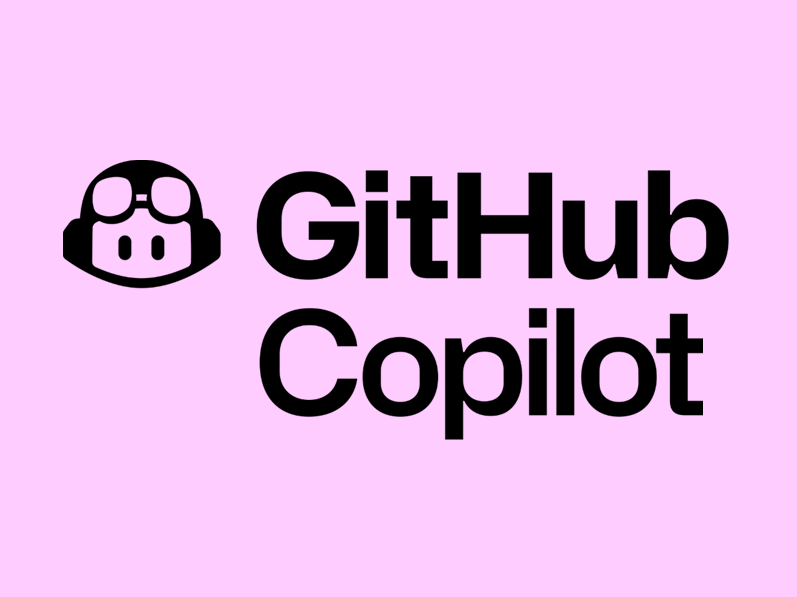
Github Copilot-Introduction
GitHub Copilot is an AI-driven coding assistant created by GitHub in collaboration with OpenAI.
Imagine a virtual coding collaborator that monitors what you code and provides you with suggestions instantly — from little lines to whole functions.
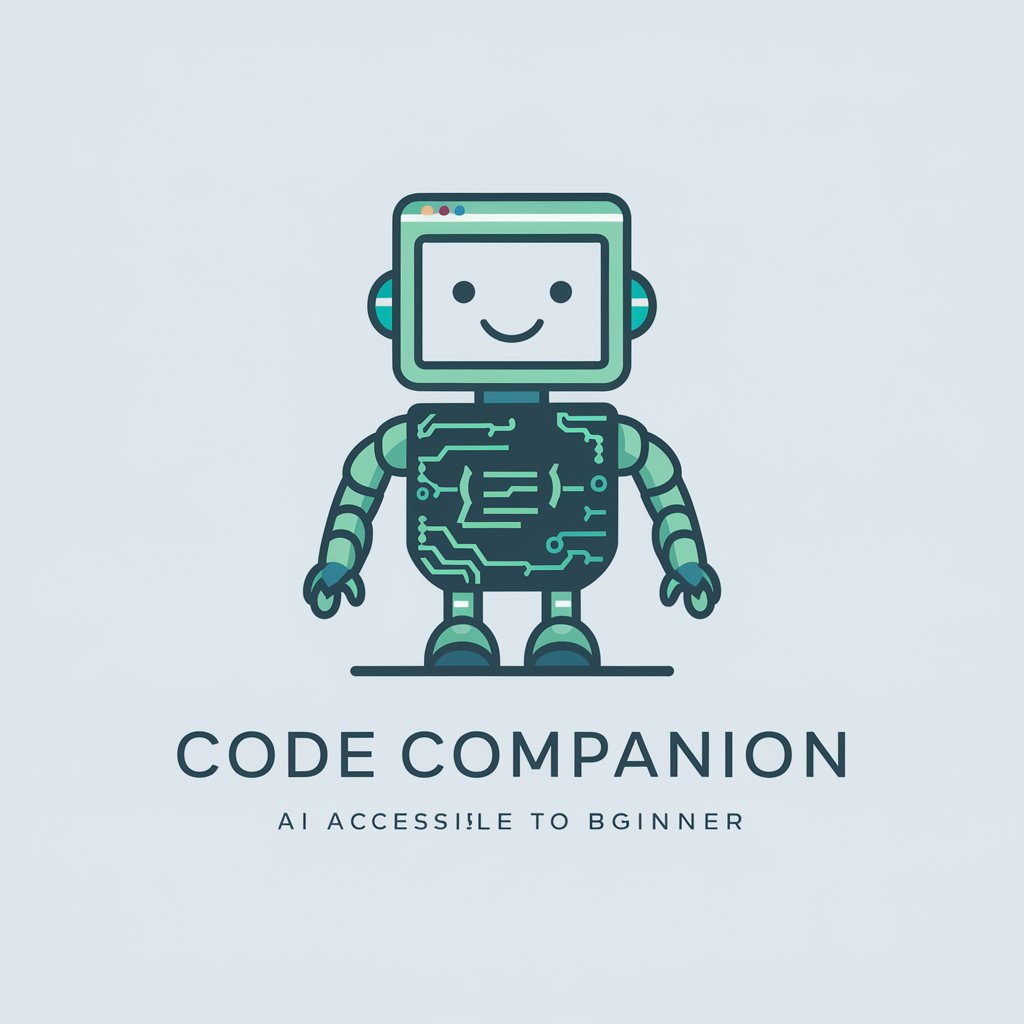
The tool is an advanced AI code generator that’s meant to make your development experience faster.
It knows programming languages, anticipates your next step, and codes for you — saving time, increasing creativity, and making you learn.
This revolutionary programming assistant, is powered by cutting-edge Machine Learning Models. By scanning your code context and understanding comments, it anticipates and proposes lines of code—all in real time.
This feature makes it not only an amazing helper for beginners but also a useful companion for experienced developers.
How GitHub Copilot Works
This Ground Breaking Assistant leverages sophisticated machine learning models to auto-suggest code, fill out functions, and even write large blocks of code based on where you’re currently working.
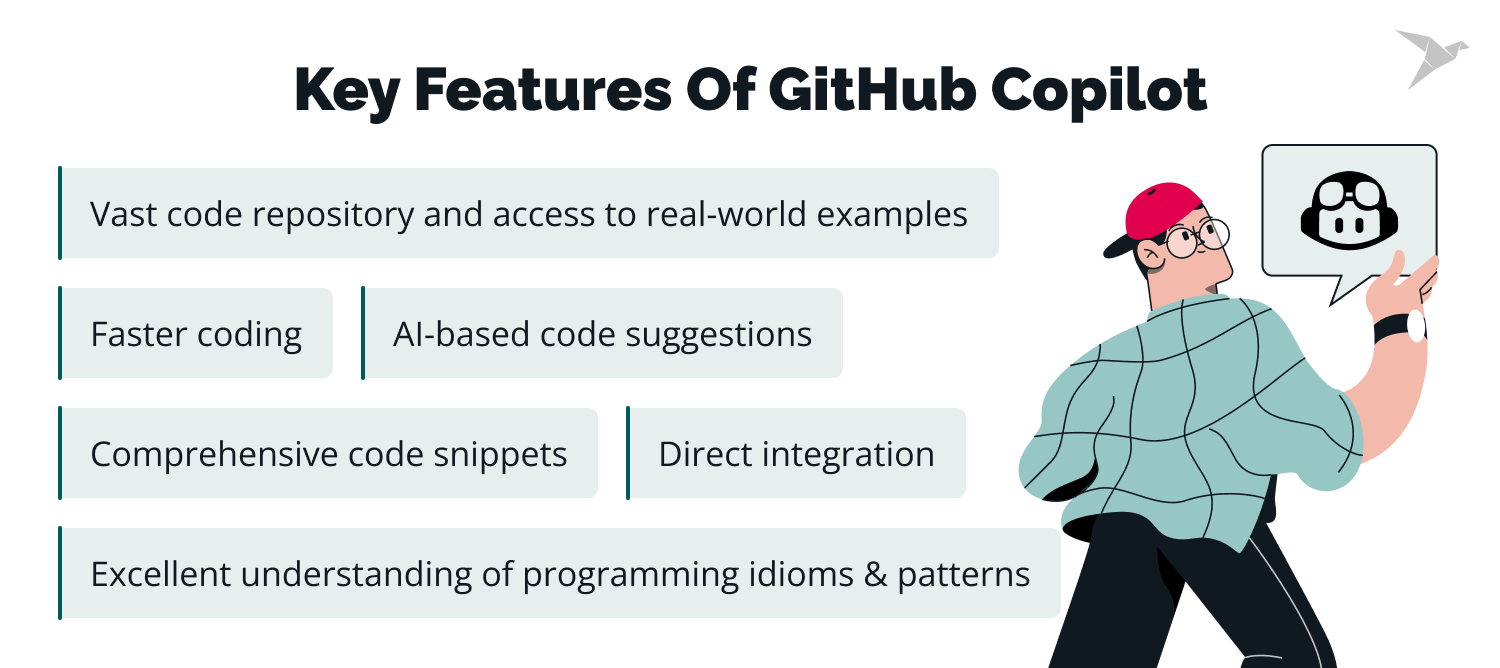
Through analysis of your code context and commentary, it not only anticipates and suggests individual lines of code but does it all in real time.
It is this level of quality which makes it an excellent helper not just for amateurs but also as a good sidekick for pro developers.
What it does:
Predicts Code:Performs auto-completion while you’re typing.
Intelligent Suggestions: Provides full-line completions and even multiple alternative solutions.
Context Awareness: Understands the code context through variable names and comments.
Supports Various Languages: Works with Python, JavaScript, C++, Ruby, and many more
GitHub Copilot is a clever tool for today’s developer, and being able to use it as an extremely competent AI code generator has turned coding on its head.
For more detailed instructions and official guidance, refer to the GitHub Copilot Documentation.
Github Installation Steps In VScode
Here’s how you can begin using GitHub Copilot:

Step 1: Install Visual Studio Code (VSCode)
GitHub Copilot can be integrated with VSCode, a widely used code editor for many programming languages.
If you don’t have it yet, download and install VSCode via the official website.
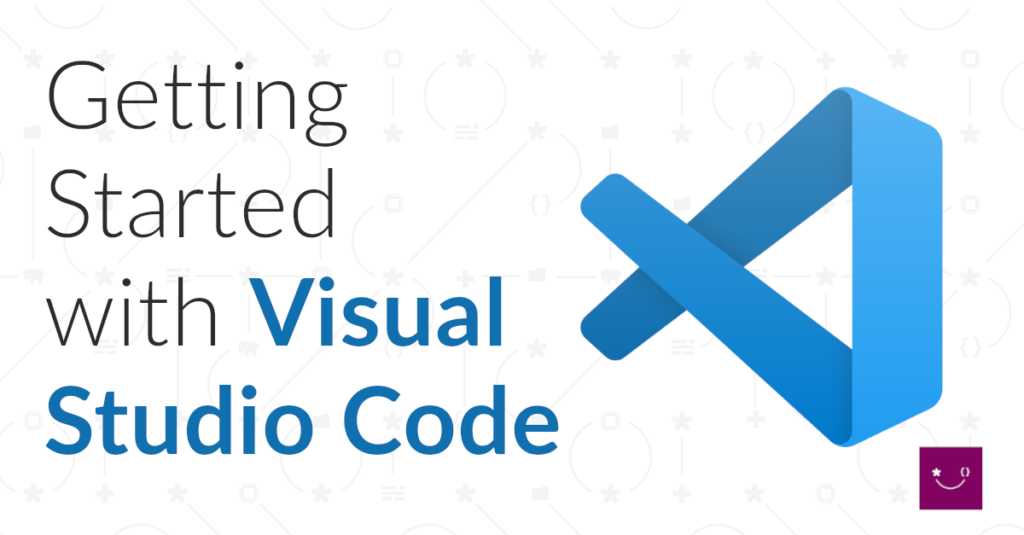
Step 2: Install GitHub Copilot Plugin
1.Launch VSCode and navigate to the Extensions panel.
2Find GitHub Copilot in the Extensions Marketplace.
click on Install, and follow the instructions to log into your GitHub account.
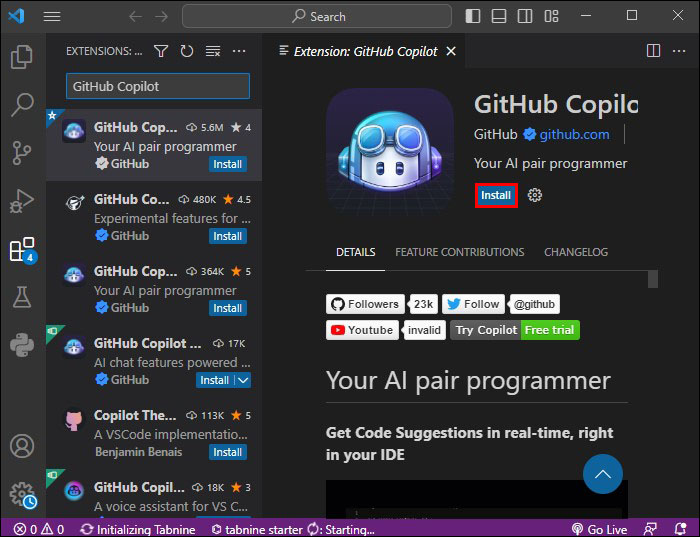
Step 3: Sign in to GitHub
Install the extension, then log into your GitHub account when prompted.. This will allow GitHub Copilot to connect to your coding environment and make personalized suggestions.
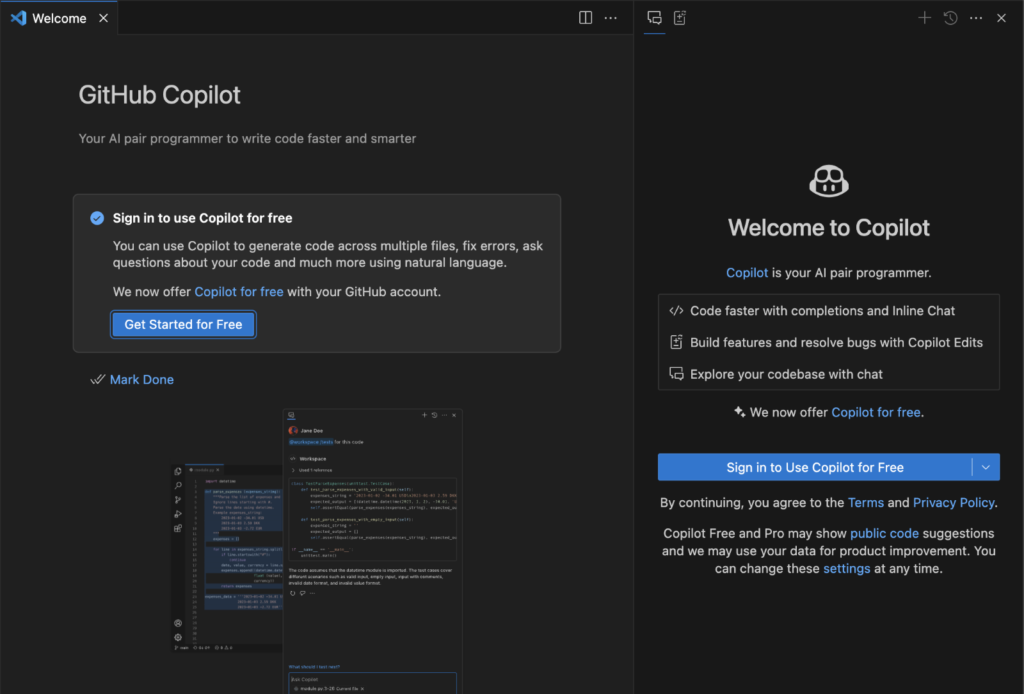
Step 4: Code with Copilot
After installing, GitHub Copilot begins to work right away.
As you start writing code, it will make suggestions on completions, complete functions, or even assist with documentation.
You can approve, decline, or edit the suggestions to suit your requirements.
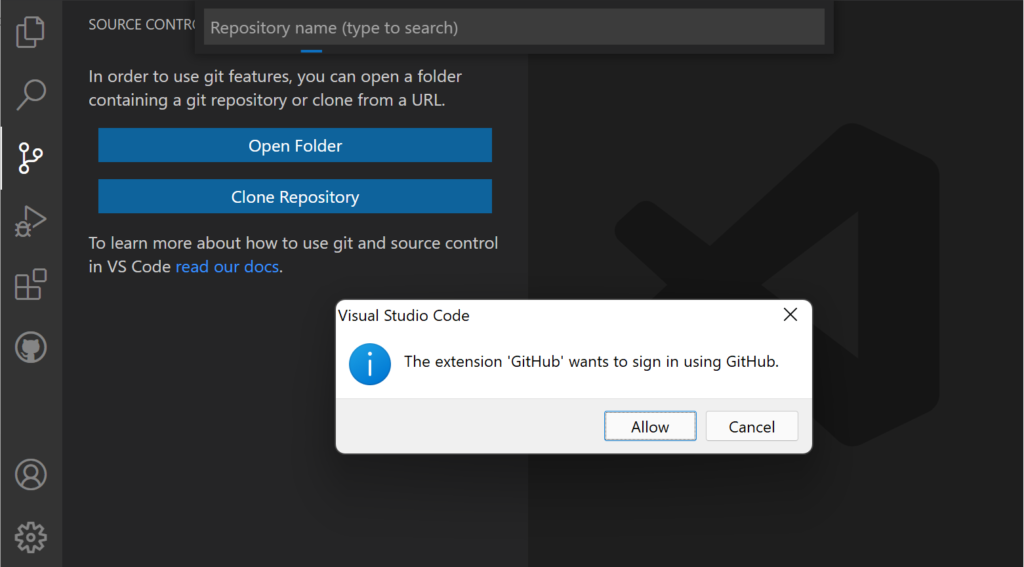
Optimizing GitHub Copilot’s Interface & Workflow
Using this code generator, it is vital to comprehend how it fits into your coding space to be able to maximize this powerful AI code generator. Let’s demystify the working aspects in plain terms:

Understanding the Interface:
• Editor Integration:
The tool directly integrates into your coding space. You receive suggestions nearly instantaneously as you type.
• Interactive Prompts:
You can add comments in everyday language, and it converts them into code snippets, providing a blend of speed and precision.
• Accept/Rejection Options:
You are completely in charge of which suggestions to accept. Browse through various choices and select the one that best fits your requirements.
By prioritizing Usability, it makes sure that any developer, from a novice to a master, can easily get used to its capabilities.
Using Code Suggestions
• Inline Suggestions:
GitHub Copilot offers real-time, Inline Completions that are shown as you type. The feature makes searching for syntax or common patterns obsolete.
• Code Snippets and Functions:
The AI code writer gives you Whole Snippets and even complete functions depending on your project context.
• Alternative Solutions:
When one completion is not a solution, you can iterate through different completions until you arrive at the best solution.
GitHub Copilot as an artificial intelligence code completion tool is developed to reduce the amount of routine work, ease coding, and ensure consistency for complicated projects.

Personalizing and Streamlining Your Workflow
Modifiable Settings:
Tune frequency and suggestion types in your settings panel to weigh speed against control.
•Feedback System:
Give feedback on suggestion quality. As a result, with time, this ai generator adjusts its accuracy and efficiency.
•Learning Mode:
Use the tool as a learning aid. New developers can see how it converts plain comments into good code, thus sharpening their coding abilities.
•Error Checking and Debugging:
As it writes code, GitHub Copilot also prompts you to inspect and try out outputs, allowing security and functionality to be preserved.
Essentially, you’re not just accelerating your development process, but also getting an interactive tutorial from the suggestions of GitHub Copilot.
The Advantages of Utilizing GitHub Copilot
It has received praise for its revolutionary effect on the way developers code. Let’s break down its core advantages in detail.

Increased Productivity
• Speed:
Automatically writing boilerplate code is a huge time-saver. Developers can focus on business logic rather than wasting time on repetitive boilerplate code.
Suggesting ideal code forms and efficient syntax, GitHub Copilot minimizes the time spent coding complex functionalities.
Better Learning Curve
• Real-Time Learning:
Beginners can study the suggestions and understand best coding practices by observing how the tool translates natural language into code.
• Code Quality:
Consistent, high-quality code suggestions help inculcate good coding habits and reduce syntax errors.
Innovation and Creativity

• Brainstorming Support:
When you’re stuck with a coding problem, this AI code helper can propose creative alternatives, sparking new ideas and approaches.
• Multiple Perspectives:
As an AI code generator, it provides several ways to implement a function, enabling innovative problem-solving.
Scalability and Flexibility
• Project Adaptability:
From small scripts to large-scale applications, GitHub Copilot scales with your projects. Its suggestions adjust based on the complexity of the code.
• Language Versatility:
The tool supports numerous programming languages, making it a versatile option across different project types.
By acting as a robust AI code generator, it boosts both productivity and creative problem-solving in everyday development tasks.
Common Challenges and Limitations
While the advantages are considerable, it’s also crucial to know the difficulties entailed with the use of GitHub Copilot.

Accuracy and Confidence
•Not Infallible:
Like every new technology, it may occasionally provide code that isn’t perfect or even faulty. Developers must double-check its results.
•Secure Coding Issues:
Completely depending on AI-provided code can create problems concerning secure coding best practices.
Manual examination and test processes are advisable.
Contextual Comprehension
•Sophisticated Projects:
For highly intricate systems, the tool may find it difficult to handle context, and hence the suggestions may need further tailoring.
•Over-Reliance:
Though an advanced AI code generation tool, GitHub Copilot is not a Substitute for Human Decision-Making. Its use as a co-pilot and not as a co-developer is necessary.
Legal and Ethical Considerations

• Code Ownership:
There are arguments about the legal implications of code produced from public repositories.
Users need to keep themselves informed about GitHub’s guidelines.
• Ethical Use:
Being explicit about the use of AI-generated content in commercial work ensures ethical coding practices and transparency.
Knowing these challenges enables developers to utilize this alongside conventional coding practices, getting the best of both worlds.
Best Practices for Maximizing GitHub Copilot’s Potential
To Maximize the potential of GitHub Copilot as your go-to AI code generator, follow these best practices:
Detailed Code Comments
•Guide the AI:
Leave clear, descriptive comments. Following this habit gives context that allows GitHub Copilot to make more accurate code suggestions.
•Descriptive Naming:
Use standard variable and function naming conventions for better accuracy in code predictions.
Frequent Manual Reviews

•Double-Check Output:
Always review the auto-generated code to ensure its logical accuracy and check for security vulnerabilities.
•Run Tests:
Write unit tests for proposed code. This habit allows for the detection of any possible problems prior to deployment.
Iterative Feedback and Adjustments
•Mark What Works:
Accept recommendations that fit your coding convention, and ignore those that don’t.
Your decisions contribute to better outputs in the future.
•Adjust Settings:
Try out the extension’s settings options to achieve a balance between automation and control that works for your workflow.
By adhering to these practices, you can make GitHub Copilot an effective AI code generator and a valuable tool in your software development toolkit.
Integrating GitHub Copilot in Modern Development
For Solo Developers
•Solo Projects:
Regardless of whether you are creating a small app or trying out a new framework, GitHub Copilot makes coding and debugging easier.
•Learning and Experimentation:
Utilize the tool to learn new programming techniques by watching how it converts comments into working code.
For Teams and Enterprises
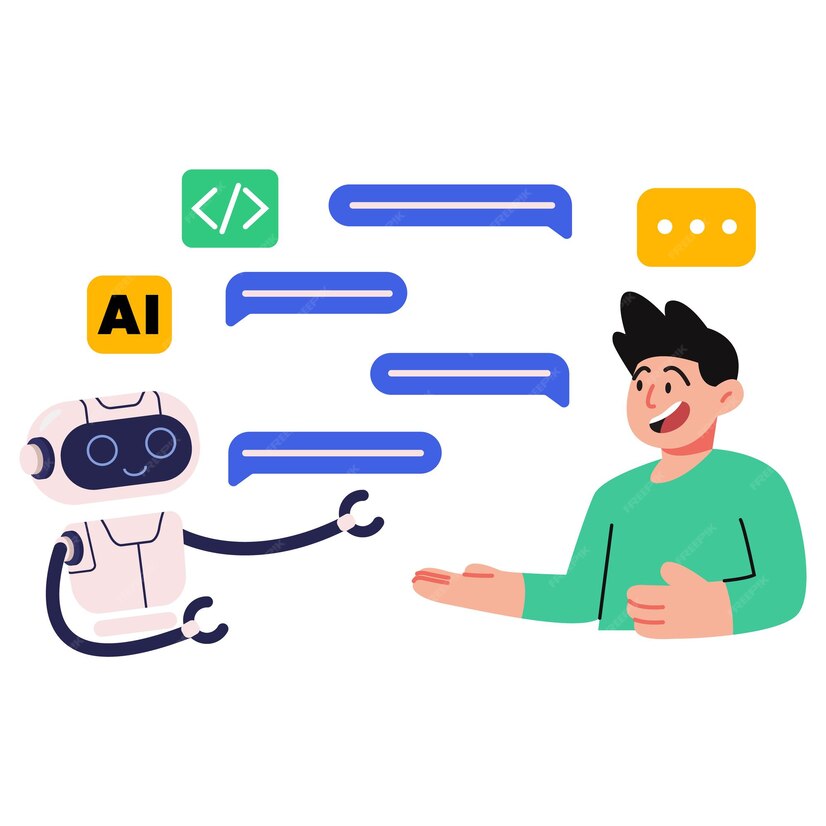
•Collaborative Coding:
GitHub Copilot fosters a collaborative culture where developers can share and iterate on auto-generated code, with consistency in large projects.
• Quick Prototyping:
In agile teams, having a code generator using AI accelerates the creation of MVPs and enables teams to iterate rapidly on product concepts.
• Standardization:
Let GitHub Copilot help you keep your codebase clean and consistent by following uniform structures and patterns.
The ease of incorporation of GitHub Copilot in personal projects as well as collaborative work highlights its significance as a reliable AI code builder for all development purposes.
GitHub Copilot’s Real-World Applications
In order to highlight its efficacy, below are some Real-World Examples of how GitHub Copilot has been of great impact:
Rapid Web Development
• Frontend Coding:
Developers building Interactive Websites can use GitHub Copilot to generate HTML, CSS, and JavaScript snippets quickly, ensuring a visually appealing and responsive design.
• Backend Automation:
For server-side logic, the tool helps generate API endpoints, database queries, and even error-handling routines in languages such as Python and Node.js.
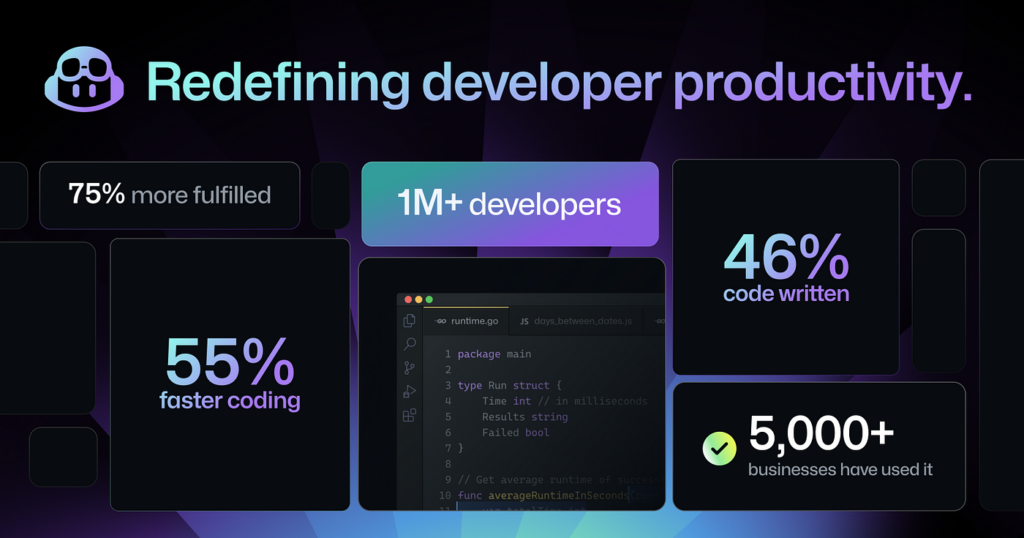
Enhancing Data Analysis Projects
• Data Science Workflows:
Integrate GitHub Copilot into Jupyter notebooks to help structure data processing pipelines, from importing libraries to analyzing data sets.
• Statistical Modeling:
The AI code generator can offer code for statistical analysis, utilizing libraries such as Pandas and NumPy within Python.
Mobile Application Development
• Rapid Prototyping:
Mobile app developers can speed up the process of creating app interfaces and backends by allowing GitHub Copilot to do repetitive code snippets.
• Cross-Platform Consistency:
Using React Native or Flutter, the tool offers consistent code suggestions that enhance cross-platform mobile app development.
Automating DevOps Tasks
• Script Generation:
Write deployment scripts and CI/CD pipelines more quickly with Dockerfile, Kubernetes setup, and automation script suggestions.
•Test Automation:
Use the software to auto-generate test cases and integration scripts to make your deployment pipeline reliable and strong.
GitHub Copilot’s status as a top-rated AI code generator is well established by these varied real-world uses, showing it to be a key element in numerous coding contexts.
Dispelling Common Misconceptions Regarding GitHub Copilot
Despite its many benefits, there are some misconceptions surrounding GitHub Copilot.. Here are some of them dispelled:

• Myth: GitHub Copilot always delivers perfect, production-ready code.
Reality: Although its suggestions are often brilliant, it needs human oversight and testing to verify that they live up to your coding standards.
• Myth: GitHub Copilot can write code without any guidance or input from the developer..
Reality: GitHub Copilot is built as a co-pilot—a productive helper to accelerate coding, not a replacement for the creative and strategic vision that only human coders can offer.
• Myth: It is only helpful for small projects.
Reality: From quick prototypes to intricate multi-language codebases, GitHub Copilot adjusts to different project needs, making it an incredibly versatile AI code generator.
Advanced Tips for Productive GitHub Copilot Use
For coders willing to make the most of this revolutionary tool, take the following advanced techniques into consideration:

Use Detailed In-Line Comments
•Direct the Suggestions:
The more descriptive your comments, the better GitHub Copilot’s suggestions. Explain the purpose of the function, expected inputs, and expected outputs.
•Example:
Instead of “// function to add numbers,”
use “// function to add two numbers and return the sum for financial calculations.”
This clarity enhances the output quality of your ai code generator.
Cycle Through Multiple Suggestions
•Review Alternatives:
Don’t limit yourself to the first suggestion. Go through the available options to identify the best match for your needs.
•Validate Logic:
Compare different code completions to know which patterns work best in your scenario.
Integrate with Testing Frameworks
• Automated Testing:
Utilize unit tests and integration tests to confirm that the generated code by GitHub Copilot is secure and works as expected.
• Continuous Integration:
Incorporate your test scripts into the continuous deployment pipeline to detect any issues at an early stage.Optimize Your Development Environment
• Customization:
Adjust your editor’s settings to optimize speed, maintain visual clarity, and ensure smooth integration with GitHub Copilot.
• Feedback Loop:
Give feedback on suggestions in order to keep improving the prediction abilities of your ai code generator.
Through these practices, you guarantee that GitHub Copilot works not just as a productivity tool but as a vital collaborator in perfecting your skills.
GitHub Copilot & AI Code Generator FAQs
1.What is GitHub Copilot?
GitHub Copilot is a sophisticated code prediction programming assistant that suggests alternatives, making it one of the top ai code generators.
2.How do I begin using GitHub Copilot?
Start by downloading Visual Studio Code, installing the GitHub Copilot extension, and authenticating using your GitHub account. Use the in-app setup to set your preferences.
3.Is GitHub Copilot compatible with various programming languages?
Yes, it works with Python, JavaScript, TypeScript, C++, Ruby, Java, and countless others—making it a very flexible ai code generator.
4.Is the code generated by GitHub Copilot production-ready?
Although it provides very helpful recommendations, always check and verify the produced code for reliability and security.
5.Is GitHub Copilot effective for learning a new programming language?
Yes. Its context-sensitive recommendations can act as live tutorials that speed up the learning process.For deeper foundational learning, resources like freeCodeCamp are ideal complements to GitHub Copilot, especially for beginners looking to build both theory and hands-on skills.
5.What distinguishes GitHub Copilot from other AI code generators?
Its extremely context-aware algorithms, simplicity of integration, and wide range of language support make it stand out as one of the most sophisticated ai code generators on the market.

Conclusion: Is GitHub Copilot the Future of Coding?
GitHub Copilot is more than an AI code generator – it’s a new paradigm of thinking about coding. It accelerates workflows, sparks creativity, and liberates you from boring tasks.
But keep in mind — it’s not a substitute for in-the-trenches skills. It’s a sidekick, not the hero.
Use GitHub Copilot wisely: let it do the drudge work, while you concentrate on writing better, smarter, and more secure code.
If used intelligently, it’s not just a tool — it’s a coding revolution in your hands.






